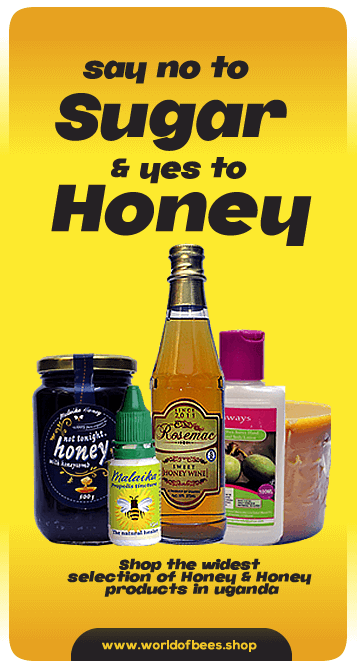BEE BETTER- Creating Women and Youth livelihood opportunities in apiculture in Uganda. (2017- 2021)
This project is funded by Irish aid through Oxfam- Uganda.
The project aims at contributing to improved livelihood resilience of 3,000 beekeepers (60% women) in Karamoja (Kotido district), West Nile (Nebbi & Arua districts) and Mid North (Gulu) sub regions of Northern Uganda.
This project is working on three specific objectives:-
- Skilling rural communities in beekeeping production and value addition of bee products (honey, propolis, beeswax, pollen and bee venom), The outcomes of this objective are;
- increase the volume of bee products produced by 40%
- Household income from the sale of both raw and value added products increased by 40%
- Women involved in beekeeping as an economic activity increase by 60%
- Equip youth and women with entrepreneurial skills for starting and growing sustainable apiculture SMEs. The outcomes of this objectives are;
- 50 apiculture based MSMEs owned by youth and women run efficiently and effectively by the end of the project
- 150 full time and 500 part-time/indirect employment created by MSMEs by the end of the project
- Entrepreneurs’ access to apiculture value chain supply credit increased by 40%
- Strengthening market linkages and contribute to policies and standards that benefit youth and women participation in apiculture value chain.
- Lucrative market for bee products working efficiently and effectively
- Unique micro climate created as a result of 75000 multi-purpose trees/forage planted
- An enabling environment for bee products’ production and trade that benefit youth and women established
What TUNADO is doing to achieve the project objectives?
- the use of Market pull approach, which involves establishment and strengthening of existing farmer owned and managed trading hubs to act as first link connecting rural beekeepers bee products to high end buyers and world of bees specialty shop, facilitate market linkages, trade promotions, business forums among others.
- Implementation of the Beekeeper to Beekeeper training and extension model to skill youth and women in apiary management, bee products harvesting, post-harvest handling, processing, quality assurance mechanisms and value addition.
- Adoption and implementation of the Gender Action Learning Methodologies (GALS) as a vehicle to stimulate women inclusion in the project.
- Equipping women and youth with entrepreneurial skills to start and grow apiculture MSMEs as a way of self-employment and creating employment to others.
- Value chain financing as a means to increase working capital for trading hubs, emerging women and youth entrepreneurs to buy bee products for on-ward trade during harvesting season and
- Creating enabling environment that benefit youth and women full participation in apiculture project (product certification, National Apiculture Policy, Tax exemption, networking and business platforms, information among others).
Achievements by 2020
- By the end of 2020, a total of 1577 people (718 women & 859 men) were reached and directly benefited the project through trainings along the honey value chain, life skills, entrepreneurship etc. while 3060 house- holds benefited indirectly
- 70% of the target group are employed in beekeeping, either in production, value addition, equipment making or value addition
- The employment in beekeeping has seen beekeeping contribute 100% household income to 30% of the participants and between 20-70% to the rest of the participants
- There is improved food security at household level within the beneficiaries, dropping from 84.3% at baseline to 51.7% (2019 data collection)
- Establishment of 10 functional trading hubs. These are acting as both bulking and collective marketing centres for bee products,
- Through engagement with government and other state actors, TUNADO is part of the national technical committee for development of standards for apiary products. As a result, the draft national standards for beeswax and propolis are in place pending public input as well as the East African harmonized standard for honey. Similarly, TUNADO was nominated to the technical committee for developing the comprehensive livestock policy where bees belong.
We thank to Oxfam Uganda for the initiative to support beekeeping.


